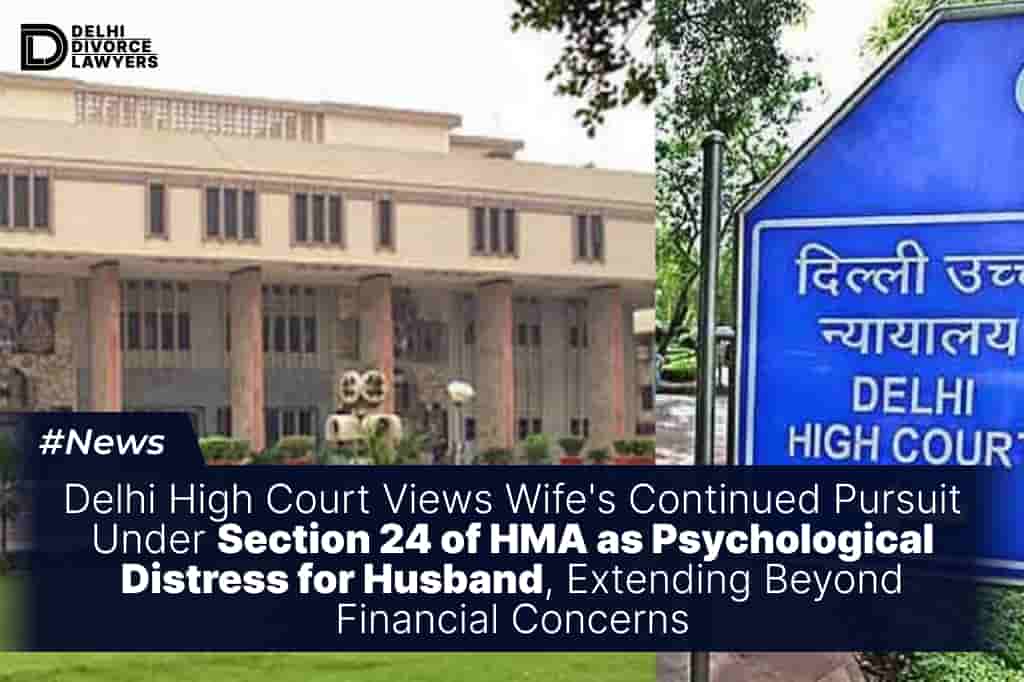On Wednesday, the Delhi High Court noted that despite the wife receiving a sum of Rs. 1 crore and 80 lakhs from her husband, her ongoing pursuit of an application under Section 24 of the Hindu Marriage Act, 1955, suggests her intention to cause mental distress to him.
“Even if it is taken that respondent had failed to financially support the appellant during the period they lived together but despite having received payment of Rs.1 crores 80 lacs from respondent, the appellant had pressed her application under Section 24 of the Act in present proceedings, this shows her ill intention to mentally harass the appellant”, the Court opined.
The Court examined an Appeal lodged by the appellant-wife under Section 19 of the Family Courts Act, 1984, contesting the ruling and decree issued by the Family Court on November 29, 2018. This decree granted the respondent’s plea for marital dissolution under Section 13(1)(ia) of the Hindu Marriage Act, 1955.
Justices Suresh Kumar Kait and Neena Bansal Krishna, comprising the Division Bench, reiterated prior judgments emphasizing the significance of trust and fidelity within marriage. They stressed that unfounded accusations of extramarital affairs amount to grave cruelty, resulting in the disintegration of the marital bond and eroding its fundamental essence.
The Bench noted that the appellant-wife had initially filed a complaint under the Domestic Violence Act in Mumbai, which she subsequently retracted. Following this, she initiated a similar petition against the respondent-husband in Delhi.
“The appellant in her cross-examination admitted that lump sum amount of Rs.2 crores was paid to her in the year 2015-2016 towards full and final settlement; and it is so evident from her statement recorded on 28.08.2015 in the proceedings under Domestic Violence Act, 2005, wherein, she stated that “I have settled my financial issues with my husband in pursuance of the settlement so I am withdrawing my interim maintenance application as not pressed,” the Court noted.
The Court referenced the Supreme Court’s ruling in Ravi Kumar Vs. Julmidevi (2010) 4 SCC 476, which clearly emphasized that “levelling baseless, false, and defamatory accusations against the husband and family members could tarnish their reputation in society” and constitute cruelty.
The matrimonial union between the two parties was solemnized on April 15, 1973, in New Delhi, with official registration occurring in Mumbai. Both individuals are citizens of Hindu American descent, holding ‘Overseas Citizen of India’ status, and share two children.
After nearly four decades of marriage, the respondent-husband initiated divorce proceedings against the appellant-wife. He alleged that marital discord had existed from the outset, citing the appellant’s sudden departure for London early in their marriage. Despite finding employment in London and subsequently in Chicago, USA, the respondent contended that the appellant’s mother made their lives challenging during their time in Chicago. Furthermore, the husband claimed that he and his family endured mental and physical cruelty from the appellant. He asserted his right to cohabit with the appellant, which he claimed she deprived him of. Additionally, he mentioned that his intention to live with another individual, with whom he was having an extramarital affair, further exacerbated the marital discord.
Conversely, the appellant-wife initiated legal action under the Domestic Violence Act in Delhi, subsequently withdrawing the case filed in Mumbai. She claimed to have dispatched numerous notices to the respondent through his legal representative and lodged a complaint in Mumbai. The appellant-wife refuted the allegations of subjecting the respondent to mental and physical cruelty, arguing that the respondent’s divorce petition was retaliatory to her Domestic Violence Petition.
The Bench opined, “It is abundantly apparent that the appellant barely sees any good in respondent and by stretching multiple litigations against him and his sister, she has made it clear that there is no scope for their reunion. Moreover, despite living separately since the year 2013, she has never made an effort to reconcile the disputes.”
“In the light of above, the present appeal filed by the appellant against the judgment dated 29.11.2018 passed by the learned Family Court in HMA No. 1036/2014, is hereby dismissed. Consequently, the marriage of the parties stand dissolved under Section 13(1)(ia) of the Hindu Marriage Act, 1955. Decree sheet be prepared accordingly,” the Court ordered.

